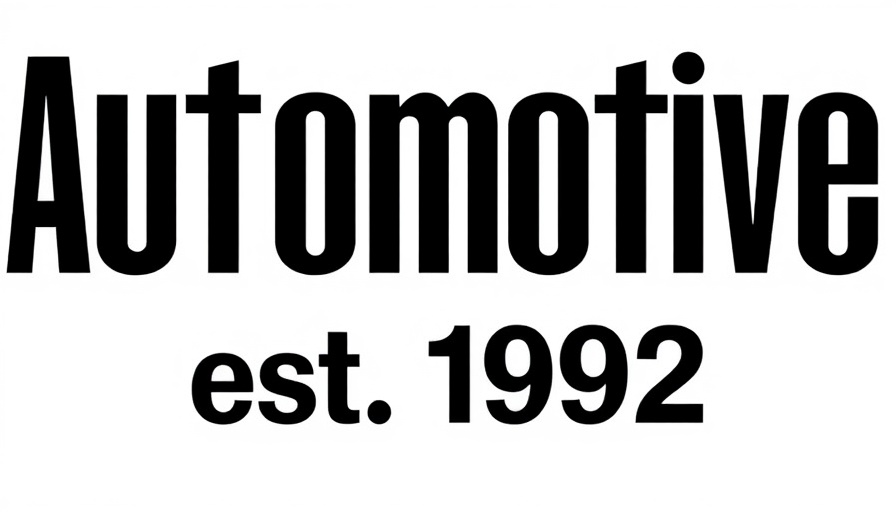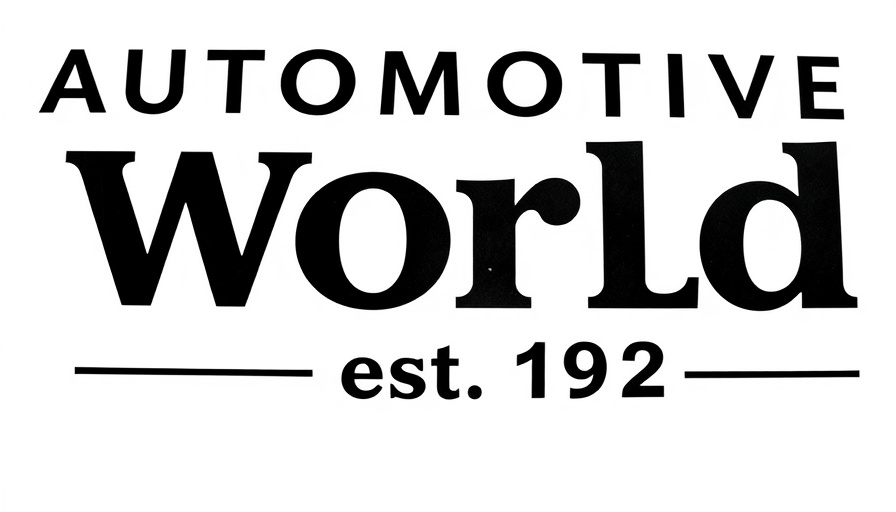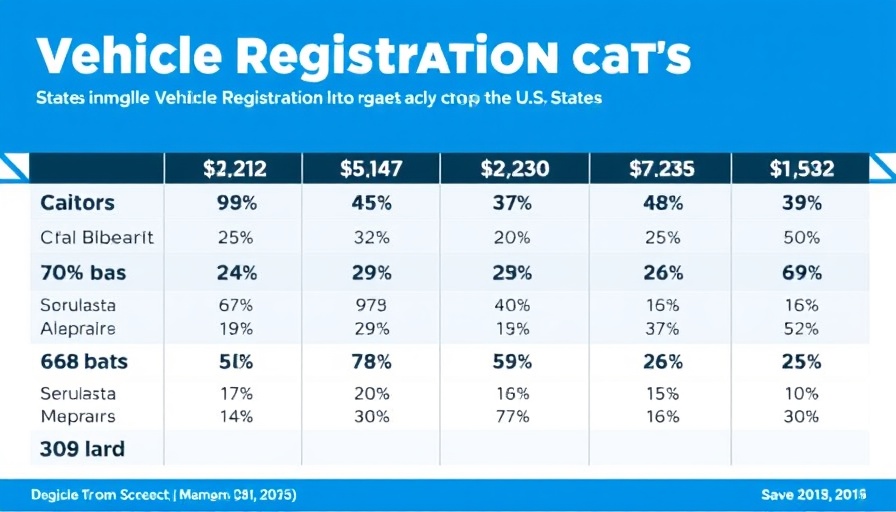
 Add Row
Add Row  Add Element
Add Element Discover the 2025 Mercedes-AMG E53 Hybrid: Power Meets Elegance

0 Views
0 Comments

Maruti Suzuki Expands Solar Capacity: A Leap Toward Eco-Friendly Car Manufacturing
Update Maruti Suzuki’s Commitment to Sustainability Shines Through Solar Expansion In a significant move towards enhancing renewable energy usage, Maruti Suzuki India Limited (MSIL) has announced an expansion of its solar capacity by 30MWp. This development includes the commissioning of a 20MWp solar facility at its new Kharkhoda plant and an additional 10MWp capacity at the existing Manesar facility. As a result, the company’s total solar capacity has risen dramatically from 49MWp to 79MWp in just one year, underscoring its commitment to green initiatives in alignment with Suzuki Motor Corporation’s Environment Vision 2050 and India’s renewable energy focus. Why Renewable Energy Matters in the Auto Industry The automotive industry faces increasing pressure to adopt sustainable practices as consumer awareness about climate change grows. Maruti Suzuki’s solar expansion not only aligns with governmental policies but also reflects a broader urgency among manufacturers to invest in renewable energy. The global shift towards sustainability is not merely a trend; it is rapidly becoming a necessity for survival in a competitive market. By transitioning to greener practices, companies can reduce operational costs over time while also contributing to environmental goals, such as the United Nations’ Sustainable Development Goal #7, which aims to ensure access to affordable, reliable, sustainable, and modern energy for all. Will Solar Power Become the Norm in Automotive Manufacturing? As Maruti Suzuki plans to achieve a total solar capacity of 319MWp by FY2030-31, backed by an investment exceeding INR 925 crore, other automotive manufacturers are likely to take heed. The company’s ambition reflects a significant trend where automakers increasingly integrate renewable solutions into their operations. Such moves could lead to a cascading effect across the industry, inspiring a collective shift towards sustainable manufacturing methods where solar energy becomes a standard instead of an option. Environmental Impact and Beyond: The Business Case for Solar Power Investing in renewable energy sources like solar power not only serves the environment but also strengthens a company's market position. Maruti Suzuki’s focus on enhancing its renewable energy consumption from current sources aims to reach 85% by FY2030-31. This shift not only fulfills a corporate social responsibility but can also improve brand loyalty among consumers who prioritize environmentally friendly practices. Dealership owners and managers should consider how embracing such sustainable practices can differentiate their businesses in an increasingly eco-conscious consumer landscape. Consumer Responsibility and the Future of Automotive Sales Training With the automotive industry's transition to sustainable energy, it is crucial for sales teams to be knowledgeable about these advancements. Training programs that incorporate information about eco-friendly practices and the benefits of solar energy in manufacturing can empower auto sales professionals to better engage with consumers. This enhances not only their credibility but also their ability to meet customers' evolving preferences for greener alternatives. As Maruti Suzuki continues to lead by example, dealership owners should reflect on how incorporating sustainability into their training programs might influence customer perceptions and sales outcomes. An informed sales team can drive conversations about sustainability, framing it as an integral part of the automotive experience rather than a mere afterthought. In conclusion, Maruti Suzuki's proactive approach towards solar capacity expansion is a pivotal step towards creating a cleaner, more sustainable future in the automotive industry. Leveraging these developments in sales training can offer progressive dealerships a competitive edge, aligning their business objectives with the necessary push for environmental sustainability. Consider how your dealership can adopt these insights today!

Wincanton's Electric-Powered HGVs: A Step Towards Greener Logistics
Update Wincanton's Commitment to Sustainability Wincanton, a leading supply chain partner for UK businesses, is taking significant strides towards sustainability with the introduction of 24 new electric vehicles (EVs) to its logistics fleet. This multimillion-pound investment is a major move in their goal to reduce carbon emissions and transition towards a greener supply chain. With the new electric-powered trucks, operational at over 40 tonnes, Wincanton estimates a reduction of 2,400 tonnes of CO2 emissions annually. Building the Infrastructure for Change To facilitate the integration of these electric trucks, Wincanton will establish depot-based charging infrastructure across its key sites, including Greenford, Portbury, and the Scotland Gateway Hub. This infrastructure, developed in collaboration with Voltempo and Gridserve, is critical for ensuring the success of its electrification efforts and illustrates Wincanton's commitment to sustainable fleet operations. Partnerships for a Cleaner Tomorrow This initiative is part of Wincanton's participation in innovative transportation projects like the Electric Freightway and the eFREIGHT 2030 consortia, both supported by the UK's Department for Transport. These projects aim to showcase the potential for zero-emission heavy goods vehicles (HGVs) and provide insights that can shape further efficiencies in logistics. Collaboration stands at the core of Wincanton's sustainability strategy, as Managing Director Carl Hanson emphasizes the importance of working with partners to unlock a greener supply chain. Future Trends in Logistics The transition to electric vehicles represents a significant turning point for the logistics industry. While the full adoption of low-emission vehicles might still be years away, Wincanton’s pioneering efforts showcase that businesses can leverage existing technologies to enhance efficiency and reduce emissions today. From the use of Hydrotreated Vegetable Oil (HVO) to powering a significant portion of its logistics fleet, Wincanton is setting a precedent for what a sustainable logistics operation looks like. Why It Matters to Dealerships and Automotive Professionals For dealership owners and automotive professionals, initiatives like Wincanton's not only represent a shift in logistics but signal broader trends in automotive sales and servicing. As companies increasingly prioritize sustainability, understanding the capabilities and benefits of electric vehicles will become essential training for auto sales teams. The emerging demand for electric and hybrid options underlines the importance of auto salesman training programs, equipping staff with the knowledge to navigate a changing automotive landscape. Turning Knowledge Into Action In conclusion, Wincanton’s introduction of electric-powered HGVs is not just a move towards reduced emissions. It also provides a blueprint for businesses in the automotive sector to follow. As sustainability becomes central to supply chain conversations, dealerships will need to adopt similar practices and invest in training their sales teams. The transition to a greener future in logistics is underway, and those prepared with the right knowledge and tools will be leaders in this transformation.

Avoiding Legal Headaches: The Importance of Keeping Your Car Tags Up to Date
Update Expired Vehicle Registrations: A Rising Concern As we step into 2025, the statistics are alarming. CARFAX has reported nearly 17 million vehicles on U.S. roads are currently operating with expired registration tags. This issue is not just an administrative inconvenience; it poses significant legal risks that many drivers may not be aware of. States like New York, Florida, Washington, and Georgia are warning residents about the severe consequences, which can range from hefty fines to vehicle impoundment and even jail time for repeat offenders. The Financial Pitfalls of Expired Tags If you thought expired tags were merely a slap on the wrist, think again. According to CARFAX data, the average lag between registration renewals is about four months, leading to fines that can escalate into hundreds or even thousands of dollars. In California, for example, law enforcement may impound vehicles with registrations that have been expired for over six months. In a recent case highlighted by CARFAX, an out-of-state driver in Massachusetts faced the harsh reality of his car being towed, which left him stranded and in a precarious situation. Implications Beyond Legal Penalties Driving with expired tags can hinder more than just your travel plans. If an accident occurs, having expired registration can complicate insurance claims, leaving drivers at a significant disadvantage. CARFAX emphasizes that staying updated with your vehicle registration not only helps avoid hefty fines but also protects you legally in case of unforeseen incidents. As families take to the roads this summer, it’s crucial to remember that a missed renewal can turn into a costly headache. Smart Solutions: Staying Ahead of Deadlines While it may be easy to overlook vehicle registration deadlines amid busy schedules, tools like the CARFAX Car Care app can provide timely reminders for all critical vehicle-related deadlines. From registration renewals to maintenance checks, this app assists drivers in staying organized, cutting down on risks associated with expired tags. As Paul Nadjarian from CARFAX points out, this type of proactive approach to vehicle care is essential to avoid the legal pitfalls of expired registrations. Overcoming Common Myths: The Realities of Legal Consequences A common misconception many have is that expired vehicle registration isn’t a big deal unless stopped by law enforcement. However, as evidence suggests, the repercussions can be severe, with some states doling out prison sentences for habitual offenders. Understanding this reality is vital for all vehicle owners to ensure compliance and protect their rights on the road. In conclusion, it’s critical to maintain vigilance with your vehicle’s registration status, especially in states where penalties are notably harsh. For more insights on vehicle care practices and to stay informed, consider utilizing innovative tools to monitor your vehicle’s needs.
 Add Row
Add Row  Add Element
Add Element Write a small description of your business and the core features and benefits of your products.
 Add Element
Add Element COMPANY
 Add Element
Add Element (215) 407-5174
AVAILABLE FROM 8AM - 5PM
City, State
32 Tanyard Rd, Richboro, Pennsylvania, 18954,
United States
 Add Element
Add Element ABOUT US
Larry J. Feldman is a 30-year veteran of the auto industry, having been an award-winning Cadillac Salesperson, General Manager, and Dealer Principal. He has owned and operated Career Changers USA since 2012. Larry was also a keynote speaker at AGWS's 15th anniversary meeting, a leader in the auto warranty sector.
 Add Element
Add Element © 2025 CompanyName All Rights Reserved. Address . Contact Us . Terms of Service . Privacy Policy




Write A Comment